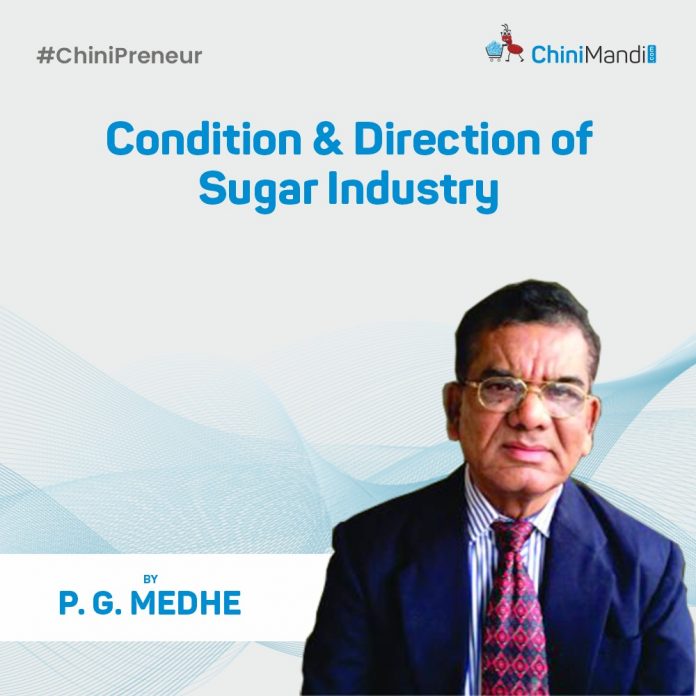The sugar industry in Maharashtra, a cornerstone of the state’s agrarian economy, has long been a driving force of rural prosperity and industrial development. Maharashtra, being one of India’s leading sugar-producing States, plays a pivotal role in the nation’s sugar industry. However, the 2024-25 sugar season presented formidable challenges, ranging from fluctuating sugarcane yields, water shortages, erratic climate conditions, and volatile market prices to policy uncertainties and global trade dynamics. These hurdles underscored the urgent need for a well-structured and resilient road map to ensure sustainability, efficient functioning competitiveness, and profitability in the upcoming 2025-26 sugar season. In this context, strategic pre-planning is no longer an option but a necessity. The sugar factories of Maharashtra must proactively implement robust measures to mitigate risks, optimize production efficiency, and leverage emerging opportunities. This article delves into the critical aspects of strategic planning for the 2025-26 sugar season, outlining key action points to counter past challenges and pave the way for a more resilient future.
Challenges Faced by Maharashtra Sugar Factories During the 2024-25 Season
The sugar industry in Maharashtra is grappling with multiple challenges during the 2024-25 crushing season, significantly impacting operations and financial sustainability. The key concerns are as follows:
1) Reduced Sugarcane Supply: Adverse weather conditions and changes in cropping patterns have led to a decline in sugarcane availability, directly affecting crushing operations and production output.
2) Delayed Crushing Season: Uncertainty regarding cane supply and logistical constraints as well as Maharashtra Legislative Assembly Elections have resulted in a delayed start to the crushing season, leading to operational inefficiencies and financial strain.
3) Short Crushing Season Leading to Higher Overheads: Due to reduced cane availability, the crushing season is expected to be shorter, increasing the per-ton cost of production as fixed expenses such as salaries, maintenance, and interest payments remain unchanged.
4) Competition from Karnataka: Increased competition from neighboring Karnataka, where mills are offering attractive incentives to farmers, has led to a shift in cane supply, further reducing availability for Maharashtra mills.
5) Shortage of Harvesting Labourers : The ongoing shortage of skilled harvesting laborers has disrupted field operations, causing delays in harvesting and transportation, which in turn affects sugar recovery rates.
6) Decline in Sugar Recovery: Unfavourable climatic conditions and delayed harvesting have resulted in lower sugar recovery percentages, impacting the overall profitability of sugar mills.
7) Increase in FRP Dues: With mills already struggling financially, the rise in Fair and Remunerative Price (FRP) for sugarcane has further escalated their dues, making it difficult to clear payments to farmers on time.
8) Financial Strain: Mills are facing liquidity issues due to rising input costs and the burden of higher FRP without a corresponding increase in revenue from sugar or ethanol sales.
9) Delay in Policy Announcements by the Union Government: Uncertainty over key policy decisions, including the restructuring of loans for sugar mills and financial assistance measures, has added to the industry’s woes.
10) No Increase in MSP/Ethanol Price Despite Higher FRP: While the FRP for sugarcane has been increased, there has been no corresponding revision in the Minimum Support Price (MSP) of sugar or ethanol procurement prices, squeezing mill margins and making it difficult to sustain operations.
11) Lack of Policy for Loan Restructuring: The absence of a clear policy for restructuring existing loans has put additional pressure on financially stressed mills, limiting their ability to invest in modernization and operational efficiency.
Given these challenges, urgent intervention from the government is required to support the industry through policy reforms, financial assistance, and measures to ensure sustainable growth in the sector.
STRATEGIC PLAN FOR SUGAR SEASON 2025-26 FOR ADDRESSING CHALLENGES FACED BY SUGAR FACTORIES IN MAHARASHTRA DURING 2024-25.
The sugar industry in Maharashtra faced multiple challenges during the sugar season 2024-25 that require a structured and strategic approach. The comprehensive plan to address key concerns and enhance the overall efficiency, sustainability, and profitability of sugar factories in Maharashtra includes following measures:
1. Sugarcane Production & Procurement –
a) Ensuring Adequate Sugarcane Availability: Collaborate with farmers to promote high-yield and disease-resistant sugarcane varieties. Implement advanced agronomic practices to improve productivity per hectare.
b) Sustainable Water Management: Encourage micro-irrigation techniques such as drip and sprinkler irrigation to optimize water use and mitigate drought risks.
c) Fair & Transparent Cane Pricing: Establish fair and timely cane payment mechanisms to maintain healthy farmer-factory relationships. Ensure adherence to the Fair & Remunerative Price (FRP) policies.
d) Digital Procurement Systems: Leverage digital platforms for efficient procurement, real-time tracking, and transparent payment settlements to farmers.
2. Mill Operations & Efficiency –
a) Modernisation of Mills: Upgrade outdated machinery with energy-efficient equipment to enhance crushing efficiency and reduce operational costs.
b) Reducing Crushing Losses: Implement best practices in cane handling, milling, and extraction to minimize sucrose losses.
c) Optimising Steam & Power Usage: Enhance co-generation efficiency to ensure self-sufficiency in energy consumption and generate additional revenue from surplus power supply.
3. Sugar Production & Quality Control –
a) Quality Benchmarking: Adopt stringent quality control measures to meet domestic and export market requirements. Implement standardized testing for ICUMSA levels, moisture content, and impurity reduction.
b) Technology Integration: Utilise automated process control systems to maintain consistency in production and improve sugar recovery rates.
c) Specialised Sugar Varieties: Encourage the production of refined, raw, organic, and low-GI sugar to cater to diverse market demands.
4. Market Strategies & Pricing –
a) Dynamic Pricing Models: Implement a flexible pricing strategy aligned with global sugar trends, ensuring competitiveness in domestic and export markets.
b) Export Market Expansion: Strengthen trade relations with key importing countries and leverage government export incentives for better market access.
c) Branding & Direct Consumer Sales: Establish branded sugar packaging and explore direct sales models to retailers and institutional buyers, reducing dependency on intermediaries.
5. Ethanol & Byproduct Utilization –
a) Ethanol Production Optimization: Enhance ethanol blending capacity in alignment with the Government of India’s Ethanol Blending Programme (EBP) to achieve targeted blending percentages.
b) Diversification of Byproducts: Maximise revenue from byproducts such as bagasse (for power generation), molasses (for ethanol production), and press mud (for organic fertilizers).
c) Expansion of Distillery Units: Invest in additional distillery capacity to cater to increasing demand for ethanol and other biofuels.
6. Logistics & Supply Chain Management –
a)Efficient Cane Transport Management: Implement GPS-based tracking for cane transport vehicles to optimize logistics and minimize delays.
b) Warehousing & Inventory Control: Upgrade storage facilities to reduce post-production losses and maintain sugar quality.
c) Integrated Supply Chain Digitization: Leverage AI-driven demand forecasting and blockchain-based traceability systems for improved logistics planning.
7. Financial Planning & Risk Management –
a) Debt Restructuring & Liquidity Management: Collaborate with financial institutions to restructure outstanding loans and ensure smooth working capital flow.
b) Insurance & Risk Mitigation: Promote crop insurance for farmers and hedging mechanisms for sugar price fluctuations to safeguard against market volatility.
c) Operational Cost Optimization: Identify and implement cost-cutting measures in procurement, production, and distribution without compromising efficiency.
8. Policy & Regulatory Compliance –
a) Adherence to Regulatory Norms: Ensure compliance with GST, environmental regulations, and food safety standards to avoid legal liabilities.
b) Sustainability Initiatives: Adopt green energy solutions, waste management practices, and pollution control measures to meet ESG (Environmental, Social, and Governance) standards.
c) Liaison with Government Agencies: Work closely with state and central authorities to address policy-related challenges and secure necessary approvals.
9. Technology & Digitization –
a) Smart Factory Implementation: Deploy IoT and AI-based monitoring systems to enhance mill efficiency and predictive maintenance.
b) Farmer Advisory Digital Platforms: Establish mobile-based advisory services to provide real-time updates on weather, market trends, and best farming practices.
c) Blockchain for Transparency: Use blockchain technology for transparent transactions with farmers and buyers, reducing fraud and payment delays.
10. Workforce & Training –
a) Skilling & Upskilling Programs: Conduct regular training sessions for factory workers, supervisors, and management personnel on advanced sugar processing techniques.
b) Safety & Welfare Measures: Implement workplace safety protocols and welfare initiatives to ensure employee well-being.
c) Collaboration with Educational Institutions: Partner with agricultural and technical universities to promote research and innovation in the sugar industry.
11. Representations to the Union Government through Federations –
a) Increase in Minimum Support Price (MSP): Advocate for a higher MSP for sugar to ensure economic sustainability for factories and farmers.
b) Enhancement of Ethanol Prices: Urge the central government to revise ethanol procurement prices upwards to encourage increased production and investment in distilleries.
c) Loan Restructuring & Financial Assistance: Seek policy interventions for soft loans, debt restructuring, and interest subventions to ease financial stress on sugar factories.
d) Export Incentives & Trade Support: Request government assistance in securing stable international markets through trade agreements and subsidies for sugar exports
e) Proposal for Consolidated Farming at Village Level to Ensure Sufficient Sugarcane Availability for Maharashtra’s Sugar Industry
Context and Problem Statement –
The problem before the sugar industry in Maharashtra, is the availability of sufficient sugarcane for crushing according to crushing capacity . With the per capita landholding of over 75% of cane cultivators reduced to just 1 to 2 acres due to the division of joint families, small-scale farming has become economically unviable. Modern mechanised farming methods, which have the potential to significantly enhance yield, remain out of reach for these small farmers due to financial constraints.
Currently, Maharashtra has 12 lakh hectares under sugarcane cultivation, producing approximately 900 lakh metric tonnes (MTs) of cane annually . The average yield stands at only 72 MTs per hectare, far below its potential. For the sugar industry to maintain viability, sugar factories must operate for a minimum of 150 days per season. This necessitates an annual cane availability of 1500 lakh MTs to sustain the state’s crushing capacity of 10 lakh MTs per day.
Moreover, with the Ethanol Blending Program (EBP) requiring increased sugar production, it is imperative to adopt strategies that maximize sugarcane yield without further expanding cultivated land. Similarly, it is the high time to think about cost reduction of sugarcane crop to bring out the sugarcane cultivators from their financial stringency.
Solution: Consolidated Farming at the Village Level –
To address this challenge, we propose the adoption of consolidated farming at the village level as a strategic approach to optimize sugarcane productivity and ensure sufficient cane supply for Maharashtra’s sugar factories. The key elements of this model include:
Land Pooling Mechanism : Small and marginal farmers within a village voluntarily pool their land into a consolidated farming system. Farmers retain ownership while participating in a collective farming approach to leverage economies of scale.
Implementation of Modern Mechanized Farming : Large-scale, consolidated farms enable the adoption of precision agriculture, advanced irrigation techniques (such as drip irrigation), high-yield varieties, sugarcane planting with five distance between the two rows (Patta Padhdhat) , intercropping, and mechanized harvesting. This can potentially increase yield from the current 72 MTs per hectare to 150 MTs per hectare—more than doubling productivity.
Financial and Institutional Support : Sugar factories, in collaboration with cooperative bodies and financial institutions, can facilitate access to credit, subsidies, and investment in modern farming equipment. Government-backed schemes and sugar industry associations should ensure financial support for consolidated farming initiatives.
Ensuring Sustainable Cane Availability for Sugar Factories –
With an improved yield of 150 MTs per hectare, Maharashtra can achieve the required 1500 lakh MTs of sugarcane annually without expanding land under cultivation as excessive land is required for other essential crops. This would enable sugar mills to operate for at least 150 days per season, ensuring financial viability and stability.
Policy Intervention and Industry Advocacy –
To implement this model effectively, it is essential for Maharashtra’s sugar industry to approach the Union Government through key industry associations such as:
a) Sakhar Sangh (Maharashtra State Cooperative Sugar Factories Federation)
a) National Federation of Cooperative Sugar Factories (NFCSF)
c) Western India Sugar Mills Association (WISMA)
d) Indian Sugar Mills Association (ISMA)
These bodies must advocate for policy decisions that support consolidated farming, including:
1) Formulation of a National Policy on Consolidated Farming for sugarcane cultivation.
2) Provision of financial incentives and subsidies for mechanized farming and land consolidation initiatives.
3) Implementation of long-term contracts between sugar factories and farmer groups to ensure a stable supply chain.
4) Expansion of government support under EBP to incentivize higher sugar production.
The adoption of consolidated farming at the village level presents a transformative solution to Maharashtra’s sugarcane availability challenge. By pooling land and implementing modern mechanized farming, sugarcane productivity can be doubled, ensuring the long-term sustainability of the sugar industry. Through proactive policy intervention and collaboration between sugar factories, industry associations, and the government, Maharashtra can achieve both higher sugar production and enhanced farmer prosperity, while supporting the nation’s ethanol blending goals. It is imperative that the sugar industry collectively pushes for this strategic shift to safeguard its future and strengthen its contribution to India’s agricultural and energy security.
The sugar industry in Maharashtra is at a critical juncture, requiring a balanced approach to address immediate challenges while ensuring long term sustainability. Through strategic planning, modernisation, consolidated farming, policy advocates and market driven initiatives, sugar factories can achieve higher efficiency, profitability and resilience against industry uncertainties. Close collaboration with farmers, policymakers and industry stakeholders will be key to navigating the evolving landscape successfully. The strategic roadmap serves as a guiding framework for the industry to adopt and thrive in the changing economic and regulatory environment.
P.G. Medhe is the former Managing Director of Shri Chhatrapati Rajaram Sahakari Sakhar Karkhana Ltd and sugar industry analyst. He can be contacted at +91 9822329898.













HON.SIR,
IT IS VERY SITUATIONAL ANALYSIS OF MAHARASTRA SUGAR N ALSO THE ROAD MAP FOR A LONGTERM REAL SOLUTION TO THE SUGAR INDUSTRIES.
REGARDS
RAM PATIL